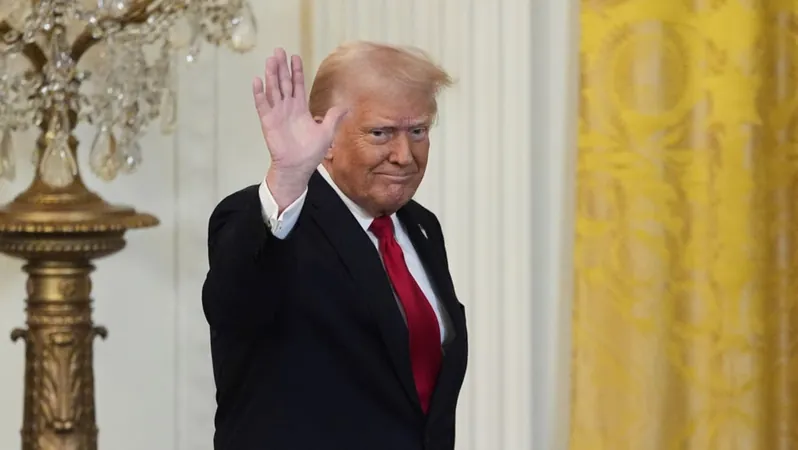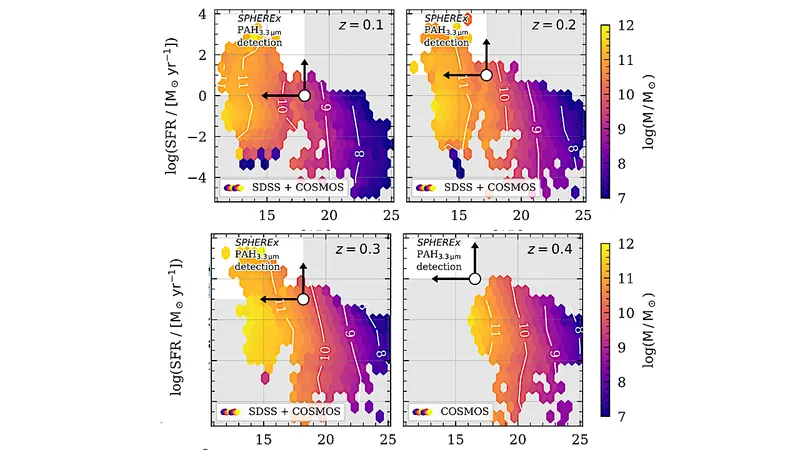
Trump’s New Tariffs Threaten to Shake Up Auto Industry and Consumer Prices
2025-03-27
Author: Daniel
Trump’s New Tariffs Threaten to Shake Up Auto Industry and Consumer Prices
In a bold move that escalates the ongoing trade tensions, President Donald Trump announced on March 26, 2024, a new set of tariffs targeting foreign automotive imports, reaching up to a staggering 25 percent. The announcement, made during an Oval Office event, marks a significant escalation in the trade war initiated earlier this year as Trump aims to boost the domestic automotive industry and reduce the US trade deficit.
"We start off with a 2.5 percent base, which is what we're at now, and go to 25 percent for all cars not made in the United States," Trump stated. This new policy is set to take effect on April 2, with the aim of not only increasing tariffs on cars but also on light trucks. The roll-out will entail tariffs beginning on April 3, further tightening the grip on foreign automakers and parts suppliers.
The tariffs are built upon findings from a 2019 national security investigation that suggested auto imports compromise US national security. Although Trump delayed taking action at that time, the recent tariff moves appear to be aligned with his broader economic strategy which combines seeking additional revenue with plans for tax cuts.
Harrison Fields, a White House deputy press secretary, confirmed that automotive parts compliant with the US-Mexico-Canada Agreement (USMCA) will remain exempt from the new tariffs for now, easing some financial pressure on manufacturers who rely on cross-border supply chains.
The repercussions of these tariffs are expected to be significant, with experts predicting that they will lead to higher consumer prices and potential job losses in the already vulnerable automotive sector. In 2024 alone, the US imported automotive products worth $474 billion, with passenger cars valued at $220 billion. Major trading partners, including Mexico, Japan, South Korea, Canada, and Germany, could feel the brunt of these tariffs, fearing devastating impacts on their exports to the US.
Even before the announcement was made, stock prices for US automakers had already started to decline, reflecting investor concerns over the potential negative economic impacts of the tariffs. The S&P 500 Index fell by 1.1 percent on the day of the announcement alone, and analysts speculate this could lead to broader market instability as investors continue to grapple with the uncertainty surrounding trade policies under Trump’s administration.
Vivek Vaidya, a partner at business consultancy Frost & Sullivan, emphasized the precarious position faced by foreign automakers, stating, "The US is like their lifeline for generating profits." He stressed that automakers must find a way to adapt to the new tariffs or risk severe operational disruptions, which may also lead to increased prices for American consumers.
Industry leaders, such as Jennifer Safavian from Autos Drive America, voiced concerns over the tariffs, predicting that they would lead to fewer options for consumers and higher prices. As costs for manufacturing escalate, the ability to deliver affordable vehicles is jeopardized, placing financial strain on US car buyers at a time when economic pressures are already high.
Looking ahead, Trump has hinted that there may be a leniency in the enforcement of these tariffs, potentially allowing for adjustments that could alleviate some immediate burdens on both manufacturers and consumers. However, with enforcement set to begin imminently, the uncertainty leaves many within the automotive industry bracing for impact.
This trade conflict not only reflects economic tensions but also sheds light on the complexities of international trade relations as countries navigate the evolving demands of global markets. How will this newly enforced tariffs reshape the American automotive landscape? Buckle up – the ride has just begun!






 Brasil (PT)
Brasil (PT)
 Canada (EN)
Canada (EN)
 Chile (ES)
Chile (ES)
 Česko (CS)
Česko (CS)
 대한민국 (KO)
대한민국 (KO)
 España (ES)
España (ES)
 France (FR)
France (FR)
 Hong Kong (EN)
Hong Kong (EN)
 Italia (IT)
Italia (IT)
 日本 (JA)
日本 (JA)
 Magyarország (HU)
Magyarország (HU)
 Norge (NO)
Norge (NO)
 Polska (PL)
Polska (PL)
 Schweiz (DE)
Schweiz (DE)
 Singapore (EN)
Singapore (EN)
 Sverige (SV)
Sverige (SV)
 Suomi (FI)
Suomi (FI)
 Türkiye (TR)
Türkiye (TR)
 الإمارات العربية المتحدة (AR)
الإمارات العربية المتحدة (AR)